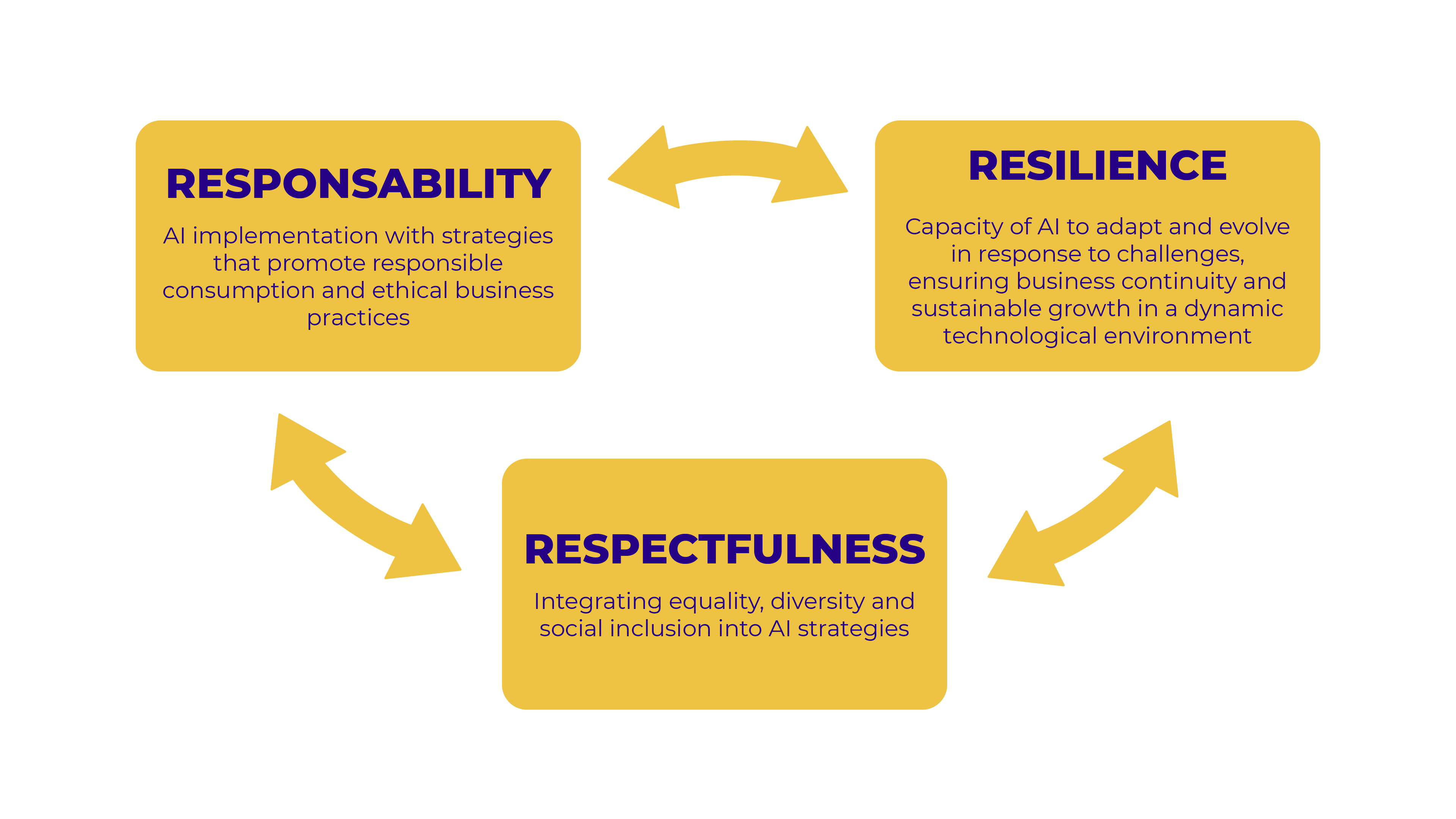Mission and ambition of the Research Center
The TRACIS research center focuses on increasing understanding and thought leadership on the transformative impact of disruptive technologies, on society, organizations, and individuals. With a focus on AI development, our main goal is to integrate cross-disciplinary insights to advance knowledge on responsible technology implementation at a systemic level, to guide public policy, influence teaching, and disseminate findings to the broader public.
Our values
By focusing on the principles of responsibility, resilience, and respectfulness, the center aims to develop research that harmonizes business objectives with societal needs, enhances sustainable growth, and promotes equitable benefits of AI and disruptive tech implementation.

Our vision
Multidisciplinary approach: to develop cutting-edge projects that transform business and society combining expertise from different knowledge areas.
Forward-looking: to keep an innovative perspective on the implementation of technology for good, envisioning new scenarios and emerging technological solutions.
Human-centric: approaching technology implementation from a systemic perspective, where human development is at the center.
Impactful Integration: to translate research into actionable insights that shape business practices, societal outcomes, and educational frameworks.
What we offer
The members of the research center are actively engaged in offering research-based insights to impact in business and societal practices around adoption and development of AI and disruptive technologies.
In our diverse areas of expertise around AI and tech, we have developed educational content on AI to transfer our research insights to the classroom and we design and develop executive workshops and seminars, collaborating with the industry in shaping the debate around responsible and human-centric technology implementation.
If you are interested in our education and impact activities, or you want to partner with us in our projects, contact us:
Prof. Dr. Lorena Blasco-Arcas: lblasco@escp.eu
Yaqiu Li (Research officer)
yaqiu.li@edu.escp.eu
Events
The center aims to host different activities during the year in order to foster connections with researchers/other related research centers, ESCP students in related programs, and the Industry.
- Regular internal seminars and workshops
- Regular industry talks with related business and policy-makers
- Bi-monthly external seminar series with management,marketing and operation management scholars.
Our People
Director
Lorena Blasco-Arcas
Director of TRACIS Research Center
Lorena Blasco-Arcas is a Full Professor at ESCP Business School and the co-founder and director of TRACIS (Transformative Research on AI for Companies, Individuals, and Society), a research center dedicated to advancing knowledge at the intersection of artificial intelligence and societal transformation. A renowned academic expert in marketing and emerging technologies, her research focuses on consumer experiences and engagement in digital environments, as well as the organizational and societal impacts of artificial intelligence and other cutting-edge technologies.
Permanent Faculty
Markus Bick
Professor
Berlin
mbick@escp.eu
Chuanwen Dong
Professor
Berlin
cdong@escp.eu
Yuting Gao
Assistant Professor
Madrid
ygao@escp.eu
Héctor Gonzalez Jimenez
Professor
Madrid
hegonzalez@escp.eu
Chi Hoang
Associate Professor
London
choang@escp.eu
Hsin-Hsuan Meg Lee
Associate Professor
London
hlee@escp.eu
Vitor Lima
Assistant Professor
Madrid
vlima@escp.eu
Isabella Maggioni
Associate Professor
Turin
imaggioni@escp.eu
Michael Haenlein
Professor
Paris
mhaenlein@escp.eu
Laetitia Mimoun
Associate Professor
Paris
lmimoun@escp.eu
Maximilian Weis
Professor
Berlin
mweis@escp.eu
Researchers:
- Erik Hermann, Berlin
Affiliated/Visiting Faculty:
- Raga Teja Sudhams Kanaparthi, Berlin
- Yaqiu LI, Paris
- Juthawan Thongborisute, Paris
Our Research Activities
This research stream explores how Ai applications and other disruptive technologies may influence individual perceptions and behaviors in different industries. With a focus on ethical and social consequences, current projects analyze a variety of AI applications ranging from responses to social and service robots, immersive technologies and virtual avatars in consumption and social contexts.
Projects related to this stream
- Data sensitivity and the human body, embodied technology and its impact on human experiences.
- Controversial use of AI at the individual level, AI competency (learning), ethical implications (reinforcing stereotypes etc) and its impact on individuals.
- Ethical, social, and psychological consequences of interactions with AI-enabled technologies and immersive technologies in consumption contexts.
- Understanding users´ perceptions of and attitudes towards AI-generated advice
- Automating influence: consumer responses to virtual influencers and well-being implications.
Recent contributions of this research stream
Blasco-Arcas, L.,& Lee, H. H. M., How to prioritise humans in artificial intelligence design for business
Brauner, S., Murawski, M., & Bick, M., The development of a competence framework for artificial intelligence professionals using probabilistic topic modeling
Dong, C., Bharambe, S., & Bick, M., Why Do People Not Install Corona-Warn-App? Evidence from Social Media
Gao, Y. & Hahn, J., The Impact of ChatGPT on People’s Engagement with Online Advice Communities
Gonçalves, A. R., Pinto, D. C., Gonzalez-Jimenez, H., Dalmoro, M., & Mattila, A. S., Me, Myself, and My AI: How artificial intelligence classification failures threaten consumers’ self-expression
Gonzalez-Jimenez, H., & Costa Pinto, D., Can AI robots foster social inclusion? Exploring the role of immersive augmentation in hospitality
Hermann, E. & Puntoni, S., Artificial Intelligence and Consumer Behavior: From Predictive to Generative AI
Hermann, E., Williams, G. Y., & Puntoni, S., Deploying artificial intelligence in services to AID vulnerable consumers
Hoang, C., & Ng, S., The facilitating effect of physiological self‐tracking on organ donation
Hoang, C., & Tran, H. A., Robot cleaners in tourism venues: The importance of robot-environment fit on consumer evaluation of venue cleanliness
Lee, H. H. M., & Blasco-Arcas, L., I don’t envy you: Exploring the effects of human vs virtual social media influencers on consumer well-being
Lima, V. & Belk, R., Human enhancement technologies and the future of consumer well-being
Rancati, G., & Maggioni, I., Neurophysiological responses to robot–human interactions in retail stores
This research stream focuses in organizations and organizational implications of the adoption and deployment of AI and other related technologies. It addresses managerial tensions related to the ethical and social consequences of AI implementation.
Projects related to this stream
- Top execs' and executive boards' role in responsible AI implementation
- Ethical, social, and psychological consequences of interactions with AI-enabled technologies and immersive technologies in organizational contexts.
- Managing the tensions between business / marketing objectives (e.g., customer satisfaction) and social/ethical objectives (e.g., reducing inequalities, countering negative stereotypes, increasing justice): moving from trade-offs to win-win situations
Recent contributions of this research stream
Blasco-Arcas, L., Lee, H. H. M., Kastanakis, M. N., Alcañiz, M., & Reyes-Menendez, A., The role of consumer data in marketing: A research agenda
Dong, C. & Li, D., Achieving Economic and Environmental Sustainability with Supply Chain Contracts
Dong, C., Saxena, A., Bick, M., & Sabia, A., On the Journey to AI Maturity: Understanding the Role of Enterprise Artificial Intelligence Service
Hoang, C., Liu, X.Y., & Ng, S., From Premium to Mass: How Service Robots Shifts Brand Premiumness
Liang, Y., Liu, Wl., Li, K., Dong, C., & Lim, M., A co-opetitive game analysis of platform compatibility strategies under add-on services
Li, Y.Q., Blasco-Arcas, L., & Lee, H. H. M., Computer vision in branding: conceptualization, typology, and future agenda
Mimoun, L., Trujillo-Torres, L., & Sobande, F., Social emotions and the legitimation of the fertility technology market
This research stream takes a macro view to address aspects related to the impacts of AI and related technologies at the system level. Hence, research in this area addresses the consequences of technology implementation in societal sustainable development and potential intended and unintended consequences.
Projects related to this stream
- Impact on societal development and well-Being from interactions with AI or other emerging tech.
- Towards responsible AI implementation practices in Marketing: a systemic view on AI ethics
- AI governance and its implications in social development
Recent contributions of this research stream
Blasco-Arcas, L., Lee, H. H. M., Kastanakis, M. N., Alcañiz, M., & Reyes-Menendez, A., The role of consumer data in marketing: A research agenda
Dong, C. & Li, D., Achieving Economic and Environmental Sustainability with Supply Chain Contracts
Chesterman, S., Gao, Y., Hahn, J., & Sticher, V., The Evolution of AI Governance
Gonzalez-Jimenez, H., Taking the fiction out of science fiction: (Self-aware) robots and what they mean for society, retailers and marketers
Hermann, E., De Freitas, J., & Puntoni, S., Reducing Prejudice with Counter-Stereotypical AI
Hermann, E., Leveraging artificial intelligence in marketing for social good - An ethical perspective
Ulusoy, E., Vicdan, H., Ekici, A., Tillotson, J. S., Hong, S., & Mimoun, L., Participatory Food Provisioning via Emerging Technologies: Revisiting Prosumption and Value Creation Beyond the Anthropocene
Vicdan, H., Ulusoy, E., Tillotson, J., Ekici, A., Hong, S., & Mimoun, L., Analyzing the Transformative Potentials of Food Prosumption Symbiosis: Implications on Market System Dynamics












